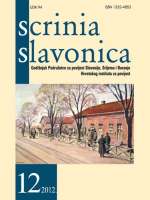Provedba agrarne reforme na crkvenim posjedima u Đakovačkom dekanatu 1945.-1948.
Land reform enforcement on ecclesiastical estates in the Đakovo deanery 1945-1948
Author(s): Slađana Josipović BatorekSubject(s): History
Published by: Hrvatski institut za povijest
Keywords: Catholic Church; land reform; Bishop Antun Akšamović; Đakovo Deanery; People’s Republic of Croatia
Summary/Abstract: This paper gives a review of the process of the enforcement of the Land Reform and Colonisation Law on the parish estates and lands of other ecclesiastical institutions in the Đakovo Deanery. The introductory part of this work presents the legislation at a federal level and later in the Federal Republic of Croatia, i.e. the People’s Republic of Croatia, as well as its principal regulations. The reaction of the Catholic Church to the law was extremely negative because it was extremely severe in relation to ecclesiastical estates and had the tendency to impoverish the Catholic Church and weaken its infl uence on society. Further, the relation of Bishop Antun Akšamović to the communist government is described in brief, as well as his attitude to the Land Reform and Colonisation Law and his mediating role in securing a more favourable position for the Diocese during implementation of the law. The central section of this work describes the implementation of land reform in estates of nine parishes of the Đakovo Deanery, in estates of the diocese and the estate of the Congregation of the Sisters of the Holy Cross in Đakovo. All numerical data are illustrated in tabular form at the end of the work. After the end of World War II the communist government rapidly started to settle property relations and to allocate lands to those cultivating it, to the peasants. For this purpose the Federal Land Reform and Colonisation Law was enacted on August 23, 1945; on November 24 of that same year a corresponding law for the territory of Federal Croatia was passed. Since this law was overly severe to ecclesiastical property and the divestment of land above 10 ha was foreseen by that law, its enforcement further exacerbated the relations between the Catholic Church and the state. During the hard post-war period, when the Catholic Church, like the majority of the population, was left in dire straits, the land reform dealt a heavy blow from which the Church could not recover for a long period of time. All over the country, including the territory of the Đakovo Deanery, the Catholic Church lost most of its high-quality lands, covered by the land reform, lands that had up to that time been the major source of income for the livelihood of the clergy as well as for church institutions and organizations. The main motive for the communist government to pass most of the laws, such as the Land Reform and Colonisation Law, was the assumption that by being deprived of its material basis the Catholic Church would be frustrated in its intention to continue to be the ideological and moral basis of society. With these laws the communist government affected the Church property and deprived the Church of its main sources of income, paying attention neither to the legally acquired assets or the legal peculiarities of the Catholic Church as a religious, educational and charitable institution.
Journal: Scrinia Slavonica
- Issue Year: 2012
- Issue No: 12
- Page Range: 295-322
- Page Count: 28
- Language: Croatian

